The cloistered nuns whose job is to serve the Pope directly
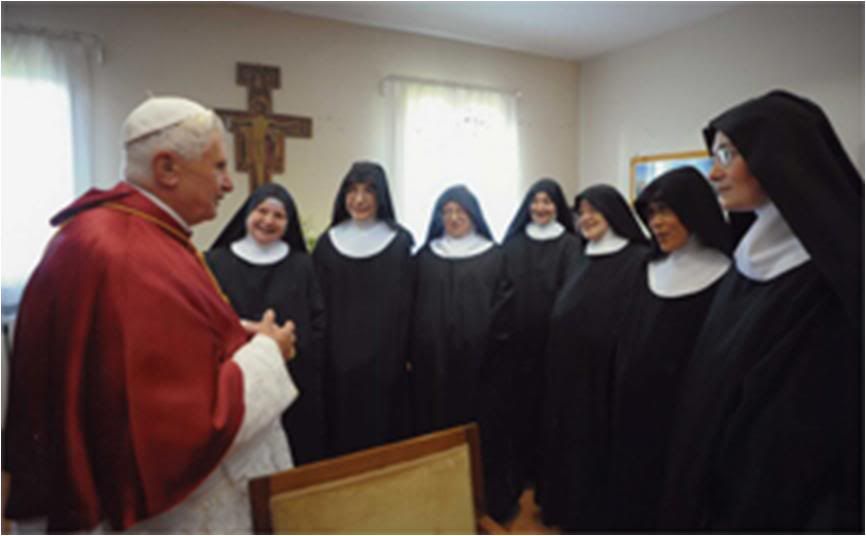 Nuns by vocation, they also raise
Nuns by vocation, they also raise
veggies for the Pope and keep
the papal clothing at Sunday best
There's a Benedictine cloistered order in the Vatican with their own convent called Mater Ecclesiae -
and besides their life of prayer (ora) for the intentions of the Church, they do quite a lot of work (labora)
in direct service to the Holy Father.
by NICOLA GORI
Translated from
the 8/24-8/25 issue of

It's a time of first assessments for the tiny Benedictine community of nuns in the Mater Ecclesiae convent at the Vatican after their first five years there. Years that they see as a call to serve the Holy Father directly in the Benedictine spirit of 'ora et labora'.
The lifestyle is the age-old Benedictine rule based on prayer and lectio divina, as well as manual labor: from the little tasks of gardening in and around the Apostolic Palace, to keeping the apparel worn by the Holy Father in public in Sunday-best condition, from embroidering his miters and stoles, to making parchment paper and miniatured, to cultivation of the Pope's 'backyard garden'.
Faithful to the Benedictine spirit, the nuns actually work the land. With a straw hat, am apron and lots of goodwill. The fruits of their labor are evident daily: fresh vegetables for the Pope's meals, and even special jams prepared with a secret recipe that they jealously guard, not to mention fresh flowers for the Pope's rooms every day.
And everything they grow is 'organic' - no chemical fertilizers but compost that comes to them from the pontifical farm in Castel Gandolfo, according to their Abbess, Maria Sofia Cichetti, who spoke to L'Osservatore Romano:
Can you give us an assessment of the five years so far of the Mater Ecclesiae convent at the Vatican?
It has been a grace and a privilege for us to be here at the center of the Church, especially near the Pope and his co-workers. It has been an experience of getting to look at the heart of the Universal Church.
It is true that in all monasteries and convents, priests and nuns, continually pray for the Pope and the Church, but here, we are in the physical presence of who we pray for.
We are nonetheless a monastic, cloistered presence, and we seek to live ever more fully our consecration to the Lord, above all, in offering our daily prayers for the Pope, for his ministry, for his intentions, for the needs of the Church and of all the world.
In our case, it has been a most enriching and joyful experience, because since we arrived here on October 7, 2004, we have been able to meet with the Pope three times, when he came to say Mass in our chapel: the first time on July 2, 2005; the next time on march 21, 2006; and then again last July 3. Each time we were able to speak to him afterwards, and of course, to receive his blessing.
Do you have any particular memories of these five years?
Our little community is composed of seven Benedictine nuns coming from different continents: a Filipino, an American, two French sisters, and three Italians.
Our communal life has been very beautiful, but not entirely problem-free, because even if we share the same Benedictine spirit, the same rule, the same ideals, we still have different mentalities because we come from diverse nations adn cultures.
We have had to work particularly on being in true communion. Of course, we believe the Holy Spirit brings unity, but he needs our cooperation.
The other beautiful experience is receiving persons who knock on our doors. Because even if we are cloistered, and deliberately cut off from the world, we are never spiritually detached from our fellowmen. Rather, we are here for their good. Everything we offer is for others, and since we are Benedictines, hospitality is something structural, essentially built into us. So every guest is seen as Jesus who has come to visit us.
We mean first of all, a hospitality of the heart, which keeps us open to the needs of others, in our prayers and in our affections. But we also receive guests in the parlor, not inside the convent itself, where we have very little space, and because of cloister rules.
Many people come to seek advice and prayers, but above all, to find a listening ear. In our world today, there's little time for anyone to listen to anybody: everyone is always running, everyone is in a hurry. Many times, people just need to find someone who can listen to their problems and their difficulties kindly. This has led to new friendships which we cultivate in prayer.
The other hospitality we offer is to all the various groups from different countries who come to pray at our chapel. They stay for Eucharistic Adoration, for the rosary, and after the prayers, they stay to share a word.
What is the importance of a monastic community within the Vatican?
We see it, first of all, as a vocation, because we were called here by the Pope. Which is a grace and a privilege. To give ourselves and live our life of consecration in a most special environment, at the Vatican, virtually in the Pope's household, where we try to do everything with love and with joy.
What are your sources of support for carrying on the monastic life?
The Pope's assistance, above all. Then, what we 'earn' with our work, because it is right that we should be able to contribute to our own subsistence, like the Holy Family of Nazareth. This is also required by our own Benedictine rule of 'ora et labora'.
Our main manual labor is what we do in the Pope's 'backyard garden' where we raise vegetables for the Pope's table and our own community.
Then we do translation work, we embroider liturgical objects for the church, and we make parchments and miniatures on commission. All of this brings income for the community.
The other work that we love to do, and which is an honor for us, is to take care of the Pope's cassocks, the gsarments that he wears in public.
Left photo, Abbess Sophia presents the Pope with some linens for the Church; right, caring for the Pope's garments.
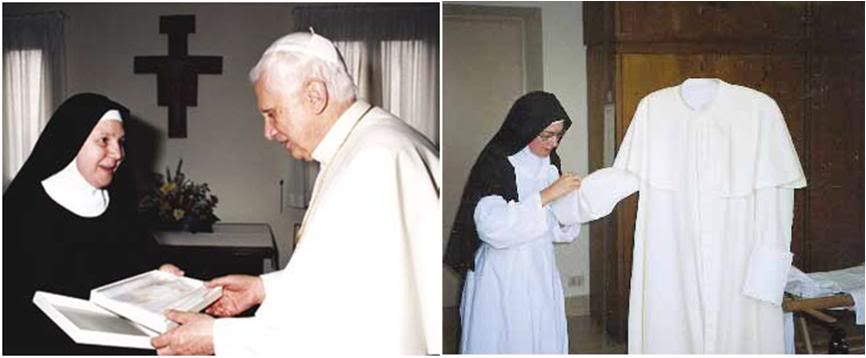 Have you established a network of friendships during this time?
Have you established a network of friendships during this time?
Yes. Very much. Including those with generous patrons, whose goodness is really quite moving. They send us provisions, furniture and other useful objects. And since we cannot accumulate superfluous things, we are able to share a lot of these with the poor.
We have two special beneficiaries right here in the Vatican: the Casa Dono di Maria run by the sisters of Mother Teresa, where they welcome many needy persons daily; and the Santa Marta pediatric clinic, which takes care of sick babies and children.
In these days of crisis, there are families among those we have come to know who need a helping hand, and we are glad that we can help somehow by sharing what we have - food, clothes. toys. We do not think of this as 'doing charity' but rather as sharing things with our brothers and sisters.
What kind of work do you do in the garden?
It's a beautiful experience for us because we are in contact with nature, adn therefore with its author, God. Tilling the soil is praying with one's hands, as well as a way of praising the beauty of Nature and of the Creator. To see the seeds germinate, to watch the seedlings grow, then see the first flowers and later the fruits - just following plant life in all its stages is fascinating. And it all helps us for prayer and contemplation.
Hoeing, digging and watering plants can be tiring, but it's all worth it when we harvest our tomatoes, peppers, zucchini, cabbages, saslad vegetables, mint and other herbs. And all of it is raised organically - with compost and cattle wastes that we get from the Pontifical Villas in Castel Gandolfo.
We don't have an orchard except for a few orange and lemon trees, from which we prepare marmalades according to a traditional recipe. This we do not sell - we give it to the Pope, who appreciates it a lot, and to our benefactors.
We also tend a flower garden for liturgies in our chapel. We grow most especially two varieties of roses - the Beatrice d'Este, which is red, and the Giovanni Paolo II, which is white and very fragrant. During the flowering season, we send roses to the Pope every week because we know he loves them.
What do you say to those who think that cloisters are anachronistic?
That cloistered life is a calling. It's a special vocation that comes to us from God, who calls us to live more intimately with him. It's not a separation or an escape from the world, but a retreat that allow us to live in greater unity with the Lord and all our fellowmen through prayer and spiritual charity.
The essence of Christianity is love, and we know this can be expressed in so many ways. This is how we live it. We associate ourselves with Christ in thr Eucharist, but hidden away, in silence, offering ourselves to the Lord for the life of the world.
Not however for selfish reasons, because it is more restful to live in quiet and tranquility - that would be selfishness. Our lifestyle enables us to give ourselves more and in better ways to God, and to offer our love to everyone with missionary fervor.
The monastic life is a true calling, a most beautiful one, which brings peace, joy and happiness.
Does the Year for Priests also involve a contemplative community like yours?
Yes, we feel that we are called on by the Pope to help bu prayer and even more intense offerings for priests and seminarians. For ourselves, this year, we intend to strengthen our spiritual motherhood - a nun is a consecrated person who loves God sincerely but loves him with a human heart which is also consecrated to our fellowmen, including priests.
SPIRITUAL MOTHERHOOD FOR PRIESTS
In December 2007, the Prefect of the Congrgation for the Clergy, Cardinal Claudio Hummes, wrote to all the bishops of the world, requesting them to encourage Eucharistic adoration for the holiness of priests and to recruit "spiritual mothers" to pray for priests and for vocations to the priesthood.
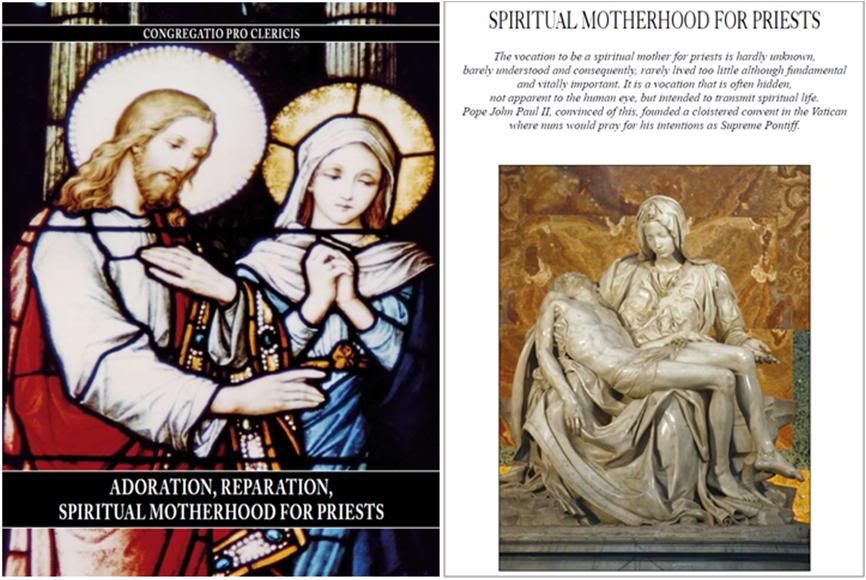
The letter was accompanied by a 40-page brochure (cover above) from which the following pictures concerning the Mater Ecclesiae community were taken:
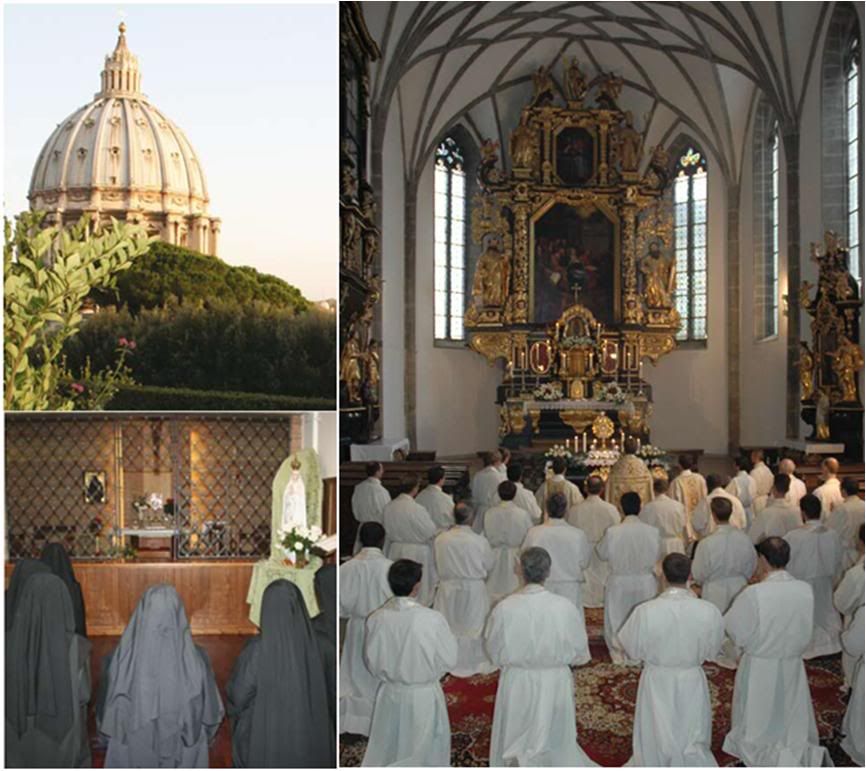
At the heart of the Vatican, in the truest sense of the word, in the shadow of the dome of St. Peter’s Basilica, lies the convent consecrated to “Mater Ecclesiae”, Mother of the Church.
This simple building, previously used for other purposes, was remodelled some years ago to fit the needs of a contemplative order. John Paul II intentionally had the inauguration date set on 13 May 1994, the anniversary of the first apparition of Our Lady of Fatima.
In these quarters the nuns consecrate their lives for the needs of the Holy Father and the Church.
Every five years this responsibility is assumed by a different contemplative order. The first international community was composed of Poor Clares from all over the world (Italy, Canada, Russia, Bosnia, Nicaragua, and the Philippines).
The Carmelites took their place in 1999 and continued to offer their prayers and their lives for the intentions of the Pope.
Since October 7, 2004, the Feast of Our Lady of the Holy Rosary, Benedictine nuns from four different countries came to live in the convent.
The Benedictines met John Paul II in his private library in December 2004.
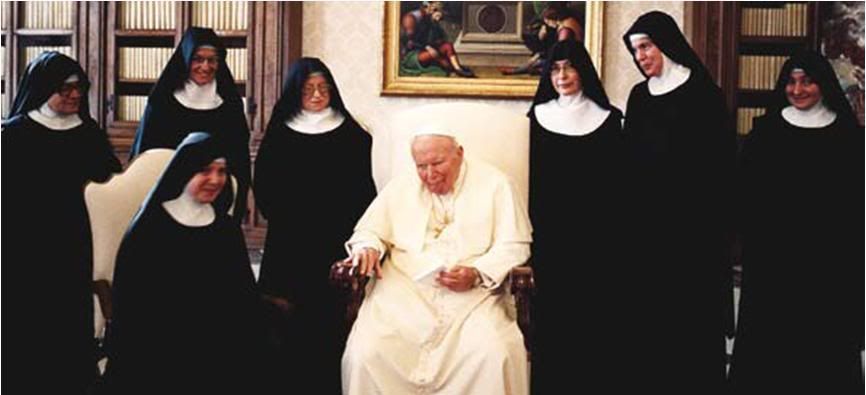
[It is surprising that the OR says nothing about whether the Benedictines are moving out as their 5-year term comes to a close. Or will an exception be made in their case?][Modificato da TERESA BENEDETTA 27/08/2009 07:22]